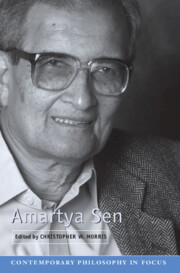Book contents
- Frontmatter
- Contents
- Contributors
- Preface
- Introduction
- 1 Preference, Choice, and Rationality
- 2 Ethics and Economics
- 3 Capability and Agency
- 4 Freedom in the Spirit of Sen
- 5 Social Choice Theory and the Informational Basis Approach
- 6 Sen on Sufficiency, Priority, and Equality
- 7 Famine, Poverty, and Property Rights
- 8 Development
- Selected Bibliography
- Index
- References
Introduction
Published online by Cambridge University Press: 05 June 2012
- Frontmatter
- Contents
- Contributors
- Preface
- Introduction
- 1 Preference, Choice, and Rationality
- 2 Ethics and Economics
- 3 Capability and Agency
- 4 Freedom in the Spirit of Sen
- 5 Social Choice Theory and the Informational Basis Approach
- 6 Sen on Sufficiency, Priority, and Equality
- 7 Famine, Poverty, and Property Rights
- 8 Development
- Selected Bibliography
- Index
- References
Summary
Amartya Sen was awarded the 1998 Nobel Memorial Prize in Economics “for his contributions to welfare economics”. Although his primary academic appointments have been mostly in economics, Sen is an important and influential social theorist. His work on social choice theory is seminal, as well as the first introduction many political philosophers have to the field. His books on poverty, famine, and development are well-known and influential. The primacy he places on liberty and its expansion is attractive to many. And, he has made many other contributions to moral and political philosophy.
One of the aims of this collection is to present some of Sen's work to a wider audience than that of scholars already familiar with it. To this end, the chapters devote a certain amount of space to presenting and summarizing Sen's writings on particular topics. There is some overlap between the chapters, as Sen's work on different topics is continuous and reflects concerns that underlie what otherwise may seem like different fields. There are some omissions, including some of Sen's most recent work, mainly because of constraints of space. This introduction is meant principally to highlight some of Sen's most important ideas and achievements, especially for those who are either unfamiliar with his work or familiar with only parts of it.
Amartya Sen was born in 1933 in Santiniketan in West Bengal, India. He spent much of his childhood in Dhaka in what is now Bangladesh. Following partition in 1947, his family moved to India.
- Type
- Chapter
- Information
- Amartya Sen , pp. 1 - 12Publisher: Cambridge University PressPrint publication year: 2009
References
- 1
- Cited by

